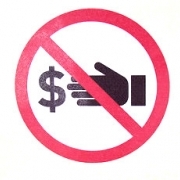IN THE WEEDS parses the nitty-gritty of important issues and laws affecting San Francisco. Check back for updates as new information surfaces.
Money buys influence. This ancient truth makes many people cynical about their elected officials, and politics in general.
A proposition on San Francisco’s November ballot is designed to do something about that. If passed, it would cut some of the ties between politicians and the moneyed interests that can push their agendas.
And it would specifically target a fundraising tactic called “bundling,” which put more money in Mayor Ed Lee’s campaign coffers than any other candidate’s in 2015.
The measure, approved for the ballot on July 25 by the San Francisco Ethics Commission, was co-written by local good-government groups Friends of Ethics and Represent.Us. It models the nationally focused agenda of Represent.Us.
Go here to read our coverage on the proposition.
What are the rules governing lobbyists?
Gifts to politicians

Lobbyists can give elected officials, and those running for elected office, up to four gifts annually if each has a fair-market value up to $25. This restriction applies to the family members of the intended recipients, too. But they do not have to report the gifts, so the San Francisco Ethics Commission would conceivably only know that lobbyists and gift recipients were violating the limitations if someone complained about them.
Contributions to candidates
Like anyone else, lobbyists can make personal contributions of up to $500 to the campaign of someone running for office in San Francisco.
“Bundling” contributions to candidates
Lobbyists can collect, or “bundle,” an unlimited number of other people’s contributions and deliver them to the intended political candidate on their behalf. Some lobbyists use this as a tool for raising vast sums, though anyone can bundle — not just registered lobbyists.
How registered lobbyists must report their activity
Lobbyists have to report to the Ethics Commission after they lobby a city official or agency, including the names of the officials and the subject matter.
What would change
Lobbyists would have to give notice before lobbying
Beginning in 2018, lobbyists would have to include new information during the mandatory registration process, as well as in their monthly activity reports: They would have to notify the Ethics Commission of the agencies they planned to actively lobby, going forward, such as the Board of Supervisors, the Mayor’s Office or the Planning Commission. They would be expected to update the Ethics Commission before they began lobbying other agencies, though they could also provide that notice without penalty in the five days following the change.
Lobbyists’ campaign contributions would be limited
During elections, lobbyists could not personally contribute to, or bundle for, candidates for offices or agencies that they were actively lobbying or that they had lobbied within the previous 90 days.
If a lobbyist did not specify the government agency he or she intended to lobby, the Ethics Commission would presume that person planned to lobby all agencies. As a result, that lobbyist would not be allowed to contribute to, or bundle for, any candidates for office.
Lobbyists could no longer give gifts
Lobbyists could no longer give any gifts to sitting politicians or candidates for office, or their family members, regardless of what those gifts were or how much they cost. Travel gifts would also be banned.
The new regulations would cost taxpayer dollars
The Ethics Commission would use $115,000 from the city’s General Fund to set up the new aspects of the registration process, which would cost an estimated $5,000 per year to maintain.
Penalties
Lobbyists who broke these rules might face fines of thousands of dollars per violation, depending on the context of the violation.
Loopholes
- Even if the proposition passes, lobbyists could still contribute to, or bundle on behalf of, candidates for city offices or agencies that they were not actively lobbying. Candidates might then feel indebted to them after attaining office.
- Only lobbyists would be affected. Anyone else could still bundle on behalf of political candidates.
Good questions
How many lobbyists peddle influence in San Francisco?
156 registered lobbyists represented private interests, as of Aug. 1.
Do many lobbyists bundle contributions heavily?
No, not in any given year, based on Ethics Commission filings. And relatively few political candidates received bundled contributions.
Which candidates benefited most from bundling in 2015?
Three-quarters of the $235,124 that lobbyists contributed and bundled in 2015 went to Lee’s re-election campaign. Much of the remaining bundled money went to his preferred candidates for other offices.
Which lobbyists bundled the most in 2015?
- Alex Tourk bundled more than $66,524 for Lee and $21,500 for Julie Christensen, Lee’s pick who was running for re-election in District 3.
- Samuel Lauter bundled $38,850 for Lee.
- Chris Gruwell bundled $25,600 for Lee, as well as $1,700 for Jose Cisneros, the city’s treasurer, who was running for re-election unopposed.
- Rich Peterson bundled $22,750 for Lee.
How would the new local rules compare to restrictions on state-level lobbyists?
In California, lobbyists and firms who lobby state officials can one give gift worth up to $10 to any politician per month — and if San Francisco voters pass this proposition then city lobbyists will face comparably harsher restrictions, losing the ability to give any gifts, including travel gifts.
State lobbyists already cannot contribute to or bundle on behalf of sitting politicians and candidates for agencies that they actively lobby. The proposition would restrict San Francisco lobbyists in the same way.
What are the different types of lobbyists?
- The Ethics Commission regulates two types of lobbyists: “contact” and “expenditure.”
- A third tier, lobbyists “on behalf of the city,” are regulated by the city’s Sunshine Ordinance and must file quarterly reports with the Ethics Commission.
Unanswered questions
- How much impact would the measure actually have on reducing influence-peddling in San Francisco politics? Is it just a paper tiger?
- How many creative ways would lobbyists find to skirt new restrictions?
- Do most San Franciscans care about such good-government efforts?









